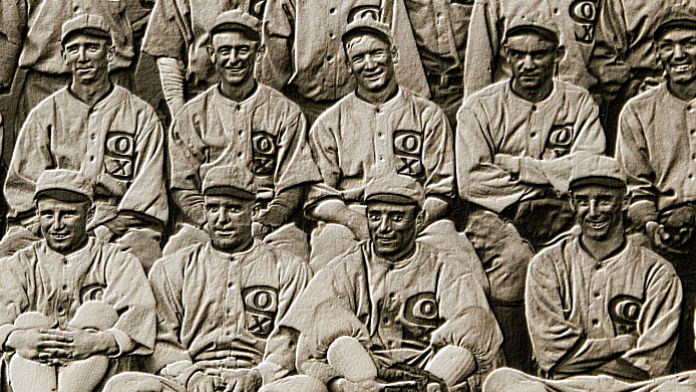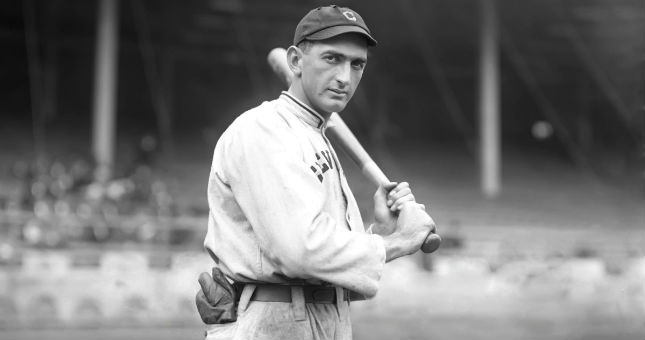Black Sox Scholar on What You Have Wrong About Scandal

Promo Code: BOOKIES
Must be 21+ to participate (18+ in KY). Gambling problem? Call 1-800-GAMBLER (CO, IL, IA, KY, KS, LA, MD, MO, NC, NJ, OH, PA, TN, VA). Call 1-800-NEXT-STEP (AZ). Call 1-800-9-WITH-IT (IN). CALL 1-877-770-STOP (LA). Must be present in LA (select parishes). Licensee partner Amelia Belle Casino. Minimum $10 deposit required. Minimum odds -500 or greater. Bonus Bets wager excluded from returns. New customers only. T&Cs, time limits and exclusions apply.
The Chicago White Sox conspired with gamblers to allow the Cincinnati Reds to win the 1919 World Series. This is fact. But much else surrounding the most notorious game-fixing scandal in American sports history – the space between the White Sox and the “Black Sox” moniker that has immortalized them in infamous perpetuity – is a subtle gray.
Why they did it. Who did it, and to what degree. Myths legends and misinformation stirred by nostalgia and pop culture, much of it emanating from Eliot Asinof’s “Eight Men Out” and the popular movie it begat. There weren’t any heroes. But there were also likely fewer villains than many believe.
In a comprehensive interview with the Badder Beats podcast, Jacob Pomrenke, the chairman of the Black Sox Scandal Committee at the Society for American Baseball Research, offers an unvarnished interpretation of the century-old scandal based on new research. The Black Sox story remains particularly pertinent today, 100 years later, as legal sports betting spreads across the nation and is embraced, remarkably, by Major League Baseball.
Q: What did Eliot Asinof get right and wrong in “Eight Men Out”?
Jacob Pomrenke: “Eight Men Out” was first published in 1963 and, and Eliot Asinof was a TV screenwriter who was hired to write for a TV program on the Black Sox scandal. Nobody had really done a whole lot of research into the scandal at that time. And so his book really pushed forward this narrative that the Chicago White Sox were kind of these underpaid, naive, uneducated ballplayers who were not paid well, they were mistreated by Charles Comiskey, the owner of the White Sox.
This is kind of the story that we've all grown up with because of “Eight Man Out.” This is why most of us believe that the 1919 World Series was fixed, but the reality is very different. It's a much more complex story and over the past few decades, a lot of new evidence has come to light that we've been able to kind of piece together the story in a little bit of a different way and turn some of what we thought we knew on its head.
We're kind of coming to a little bit more of a comprehensive understanding of what really happened 100 years ago and just what baseball was like and what the conditions were that kind of led up to this whole scandal. This wasn't something that was just kind of out of the blue that that just happened, that, nobody really knew was coming and was kind of this loss of innocence that people talk about in terms of the Black Sox scandal.
But this was something that was kind of the culmination of a lot of years of game-fixing and corruption, and the influence of gambling in baseball was all around for years and years. And it just kind of led up to this whole fix.
Q: Is there any question that those eight players actually conspired to throw the World Series to the Cincinnati Reds?
JP: Oh, they definitely fixed the World Series. That has never really been under dispute. And none of the new research has come under fire for that. The bigger question is kind of how and why. We'll never really be able to get into their heads to figure out exactly why they threw the World Series. Again, kind of the central thesis of “Eight Men Out” and the story that we've all grown up believing is that these guys were disgruntled at the treatment by their owner and by team management and they were resentful of their low salaries and the reality is far different.
We've got some salary information that is much more accurate today than what was reported in the newspapers and what was reported in “Eight Men Out,” and it turns out that the White Sox actually had one of the highest payrolls in baseball. Most of the Black Sox players were actually paid better than their peers around the game.
This really had very little to do with why they threw the World Series and the players themselves rarely claimed that Charles Comiskey had anything to do with it. They never really used that as an excuse too often. Occasionally, they would mention that they were paid low, but that was actually more of a function of the reserve clause system that baseball was under at the time.
All players' salaries were kind of a suppressed in that era. But if the White Sox had reason to throw the World Series because of their low pay, well, so did the Philadelphia A's and the Chicago Cubs and so did every other team in baseball.
I think you can kind of come to a little bit of a different conclusion that this was just something that was going on. It was rampant around baseball.
Gamblers were just all over the game. They were at every ballpark. Sometimes they had reserved sections at some of the ballparks, around the major leagues, to bet on games.
So, this was something that was going on all over the place. And I think for the most part, the players just saw the opportunity to make a little extra cash and decided to go with it.
Q: Is it ironic or at least annoying to White Sox fans that the commencement of the Black Sox investigation began with an inquiry into the Chicago Cubs?
JP: It was a Phillies-Cubs game in 1920, not 1919. That was the start of the legal investigation. They called a grand jury in Chicago and Cook County to investigate gambling and baseball and they started with this rumor that Phillies-Cubs game had been fixed, and it likely had.
Grover Cleveland Alexander, the Hall of Fame pitcher, was the ace of the Cubs and was approached by a gambler to throw a game late in the season in 1920. And so, this is how the investigation got started. This was kind of the pretense they use.
But very, very quickly the focus shifted away from that Cubs-Phillies game onto the 1919 World Series and all the rumors that the White Sox had thrown it. And it kind of snowballed from there.
Once they started getting some witnesses to talk about what they knew, some other players on other teams, John McGraw came in from the New York Giants. He testified along with a few other of his players, because they had their own game-fixing the scandals going on that year. Baseball had actually done a pretty good job of covering up the 1919 World Series fix for almost an entire season.
But they were finally able to get that grand jury started. And that's kind of what snowballed and made the 1919 World Series fix exposed.
Q: And the Black Sox fixing games into 1920?
JP: Yeah. We now have a lot of evidence that they were fixing games throughout the 1920 season. And this is something that was hinted about in “Eight Men Out.” The gamblers still kind of have their tentacles into the players and they were still bribing them and getting them to throw games in 1920. But again, this is something that was going on throughout baseball.
Teams were throwing games, teams were taking a little extra money not to play as hard. This is something that happened throughout the game. There was another scandal in 1917 involving the Detroit Tigers and the White Sox players actually raised up a pool of money to pay off the Tigers.
So, they were the ones that bribed the Tigers to lose these games. This is something that happened throughout the game. And baseball had many, many opportunities to clean up the game and to stop these practices from happening, but they always failed to do so. They never really took serious action. They never punished anyone who was caught bribing teammates or opponents.
Hal Chase was kind of the dark prince of baseball, the black prince of baseball and the most notorious game-fixer pretty much of all time, and they never really punished any of these players. So, I think the White Sox in 1919 really saw little risk to fixing the World Series.
They didn't think baseball would take it seriously or do anything about it because they never really had before.
I think that they were very surprised when baseball finally did take it seriously. And then they hired a commissioner, Judge (Kenesaw Mountain) Landis to come in and really clean up the game.
And I think they were all very surprised that all of a sudden they're going to point the finger at them and kick them out of baseball for life. I don't think they had any inkling that that might be a possibility.
Q: Why do you think baseball suddenly got serious about it?
JP: I think times had changed. I think after World War I there was this big reform movement and Prohibition was kind of the poster child for that whole reform movement. But this is something that they were trying to do around the country.
There was a huge movement to kind of clean up the corruption that had kind of risen throughout the war years. And after 1919, I think this was something that the Black Sox players kind of failed to see, that the times had changed a little bit and the federal government was going on raids against communist sympathizers, the Palmer Raids, at that time …
There was this sentiment that was growing throughout the country that “We're not going to put up with of all the corruption of the earlier years in the early 20th Century.” And I don't think they quite understood that.
I think that was something that came as a surprise to them. They thought once baseball got started again in 1919, the first full season after World War I had ended, I think they kind of went back to business as usual. And when they fixed the World Series, I don't think they were thinking that anybody would actually take it seriously, because, again, no one really had before.

Q: And the White Sox players made the initial approach to the gamblers?
JP: Yeah, that's one of the myths that we have a kind of debunked in recent years, this idea that the players were these uneducated, naive, kind of country bumpkins. But for the most part, these were pretty savvy people and most of them actually were pretty well educated except for Shoeless Joe Jackson and Happy Felsch. I think (they) were the only two players that were fairly uneducated, formally.
But Shoeless Joe was actually a really smart man. He was a very shrewd businessman. He ran successful businesses for the rest of his life after baseball. These were not dumb ballplayers. They were pretty savvy. They knew what they were doing. And they were the ones who approached the gamblers.
And I think that's one of the bigger myths of this whole story is that the gamblers convinced them to do it, they were very reluctant participants. No. It's very different. Eddie Cicotte and Chick Gandil are the two players who were kind of the ringleaders and they were the ones that approached their teammates and they were the ones who approached the gamblers. Again, this was just something that happened.
This was something that went on throughout baseball and other games were fixed, too. There was a scandal right before the 1919 World Series involving Ty Cobb and Tris Speaker, two of baseball's greatest players ever, and they just conspired to fix a Tigers-Indians game at the end of the 1919 season. This was all very casual for them.
And so, yeah, I mean the players just saw an opportunity to make some extra money, I think, and tried to try to take advantage of that.
Q: There were Black Sox and Clean Sox? What was the level of tension in that clubhouse?
JP: The Clean Sox were obviously all the players that did not participate in the World Series fix. And this included a couple of Hall of Famers like Eddie Collins and Ray Schalk and Red Faber. I can't even imagine how they got through that 1920 season knowing that their teammates had betrayed them in the World Series the year before.
This was kind of one of the worst-kept secrets in baseball. I think around the game, kind of in the inner circles, people knew that the World Series had been fixed and nobody really wanted to say so out loud.
Everybody had known what was going on and a lot of other people suspected that they were throwing games in 1920 and I can't even imagine how hard that must have been to take the field and to ride the trains and travel from city to city with these guys living with them for six months during the season knowing that you had no idea whether they were going to try their best in the next game.
That must have been heart-wrenching for these players. They talk very often in interviews afterwards of how difficult that 1920 season was. There was a lot of dissension, on and off the field. They would get into arguments with each other.
There are some stories of some of the Clean Sox players basically accusing their teammates of throwing games right then and there on the field. There's a story about Dickie Kerr, the pitcher, the rookie pitcher in 1919 who won two games in the World Series.
He accused some of his teammates of throwing games in 1920 and he came off the field and he threw his glove into the dugout and he said, “If you guys had told me you were throwing the game, I could have helped you a lot better.”
This was kind of how open it all was. It became such a huge story because it was the World Series. If this had been just a random game in May or June, I don't think anybody would've cared all that much. Just like they hadn't before.
Q: How accurate is the sympathetic portrayal of Buck Weaver in the movie version of “Eight Men Out?”
JP: There were many, many degrees of guilt that were very different among both the eight White Sox players and everyone else in baseball. Buck Weaver was banned for life because he had so-called guilty knowledge of the World Series fix. And there is no doubt that he did.
We do have evidence, we have a lot of testimony that he was part of multiple fix meetings before the World Series, discussing the fix and possibly even meeting with some of the gamblers. So we know that, that he knew about it, that he was part of those discussions, but after the fact, no one ever claimed that he accepted any bribe money and no one ever claimed that he played less than his best on the field during the 1919 World Series.
His case is much more nuanced, I think, than really any of the other seven, including Shoeless Joe Jackson. I think Weaver's case is very difficult because I think a lot of people do have sympathy for not wanting to squeal, not wanting to snitch on your teammates.
And again, this is something that the players I think just took so casually. Games had been fixed before. They had seen it.
I think if you were around baseball at that time, you really wouldn't have thought too hard about it. “Oh, these guys are making some extra money. Okay, good for them. Maybe one day I'll get a chance, too.”
But I just don't think that he considered that as long as he didn't take the money, I don't think he even considered the possibility that he would ever get punished for that. And so a lot of people have sympathy for him because his degree of guilt is very, very different from, say, Chick Gandil or Eddie Cicotte, the two big ringleaders of the fix.
And Shoeless Joe Jackson, I think, is another case. I mean, he actually was not part of any of the meetings. No one really ever claimed he was part of the meetings. But he did accept the prize money. No doubt about that. He admitted that. We even know what happened to the money. He used it to pay off his little sister's hospital bills in Savannah, Georgia. We know he took the money.
There's still a lot of debate over whether Shoeless Joe played his best during the World Series. There is some evidence that he kind of seem to let up early in the Series and didn't have any RBIs for the first five games and so a lot of his stats were accrued late in the World Series, kind of after the Reds had already won the first four of five.
I think there is some evidence that he may have been a part of it on the field too, that he might have “earned” his bribe money. But their cases are a little bit different. They're not quite the same as Eddie Cicotte and Chick Gandil. The degrees of guilt are a little bit different, but baseball punished them all the same. I think people see a little bit of an injustice in that sometimes.
Q: Eddie Cicotte confesses first?
JP: Yes, he was the first player to go to the grand jury.
Q: Then Joe Jackson and Lefty Williams did also, but in 1921 after they were all acquitted, Landis was appointed by owners to make things right for their collective image?
JP: The criminal trial is again, another one of those big myths that people have about the Black Sox scandal, that this trial was kind of a farce and the confessions of the three White Sox players that you mentioned were stolen and that's the reason that they were acquitted and this was all part of kind of Chicago's legal shenanigans at this time.
The trial was actually a pretty good trial and the stolen confessions really had nothing to do with it. There was a transcript of the confessions that were stolen, but they were replaced very quickly by the court stenographers’ notes. The testimony was read right back into the record during the trial.
So, it actually had nothing to do with this whole big dramatic scene in the movie “Eight Men Out” and in the book, really never happened because they read the testimony right back into the record and it was part of the trial, just like normal.
Judge Landis came in and he kind of had this mandate to clean up the game and the way he chose to do that was just to lay a heavy hand on anyone associated with gambling and game-fixing.
And he decided just,”'We're going to punish everybody. We're going to kick them out. We don't care whether you fixed the game, whether you were approached to fix the game, or even whether you just discussed the fixing of a game, like Buck Weaver, we're going to kick you out regardless.”
And that really kind of put the fear of God in a lot of players realizing – and I think the Buck Weaver punishment was really crucial because if Buck Weaver could be banned for life, and nobody had really questioned his integrity and he didn't take any bribe money – if he could be banned for life, then anyone could.
I think that was a punishment that, even though it was extremely harsh for Buck Weaver, it was very, very effective to help clean up the game and kind of get rid of this culture of game-fixing and corruption that had kind really enveloped the game throughout the early 20th century.
About the Author

Brant James has written for SI.com, ESPN.com, USA TODAY and the Tampa Bay Times, among other publications.

 Ryan O’Reilly Trade Odds
Ryan O’Reilly Trade Odds  Nazem Kadri Next Team Odds
Nazem Kadri Next Team Odds  March Madness Perfect Bracket Odds Compared To Powerball, Mega Millions
March Madness Perfect Bracket Odds Compared To Powerball, Mega Millions  Golden Nugget WV Sign Up Bonus March 2026: Get 24 hour lossback $1,000 in Casino Credits & 500 Bonus Spins on Huff N' Puff
Golden Nugget WV Sign Up Bonus March 2026: Get 24 hour lossback $1,000 in Casino Credits & 500 Bonus Spins on Huff N' Puff  BetMGM MI Casino Bonus Code BOOKIESCAS: Get $1,000 Bonus Match + $25 on the House (Mar. 3)
BetMGM MI Casino Bonus Code BOOKIESCAS: Get $1,000 Bonus Match + $25 on the House (Mar. 3)  Fanatics Casino NJ Bonus Gives 1,000 Bonus Spins on Triple Cash Eruption (Mar. 3)
Fanatics Casino NJ Bonus Gives 1,000 Bonus Spins on Triple Cash Eruption (Mar. 3)
Comments